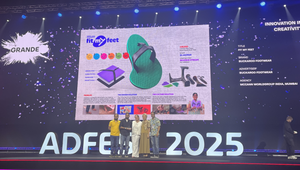
McCann Worldgroup Unveils the “Asian Dream” Through New Study

McCann Worldgroup today launched its latest Truth Central Study, the Truth about Ascending Asia, at an event held at Singapore’s Asian Civilisations Museum. Over 70 clients, partners and media joined the network to hear from guest speakers including Google, L'Oréal and Mastercard.
This groundbreaking new report highlights how Asia is poised to enter a transformative era, characterised by the emergence of a distinct “Asian Dream.” This concept is defined by the convergence of socio-economic shifts, technological advancements, and cultural evolution, providing a compelling alternative to traditional American and European ideals.

The study encapsulates insights from over 12,000 individuals across 12 diverse markets, 44 expert interviews, and more than 100 hours of social listening, examines the attitudes, aspirations, and values of Asian consumers in an age of rapid change*.
Shilpa Sinha, McCann Worldgroup’s APAC chief strategy officer, opened the event by sharing key insights from The Truth About Ascending Asia, reflecting on how Asia has been setting benchmarks of exceptionalism in economic success and technological disruption, even in the wake of significant social problems.
Key Highlights from the Research:
1) Optimism Amidst Global Challenges:
The rise of Asia unfolds against a backdrop of global turmoil, including climate change, growing inequality, and geopolitical tensions. However, the study reveals a markedly optimistic perspective among Asians:
Only 41% believe they will need to leave Asia for a better life, in stark contrast to the 85% who feel that their everyday life will be significantly better in the next decade.
Furthermore, 83% of respondents anticipate a more peaceful life in Asia compared to the West, indicating a belief in the region's stability and potential.
2) Defining the Asian Dream:
The “Asian Dream” is described as a vision woven with principles of equity, stability, and leadership. The report identifies three pillars:
Commensurate (All-in Equity): Among respondents, economic equality between rich and poor is ranked as the most crucial element for Asia's future, with geopolitical equality between Asia and the West considered second. Notably, 70% agree that if feminism means equal rights for all, then they identify as feminists.
Composure (Equilibrium in Society and Nature): A significant 82% prioritise social stability over individual expression, and an impressive 96% believe that organisations should be legally mandated to protect the environment.
Captaincy (Commercial and Thought Leadership): A striking 92% believe Asian brands will become more influential globally, while 76% feel that Asian societies are better equipped to handle the stresses of modern life than their Western counterparts.
3) The Role of Brands:
Brands are no longer passive players; they are viewed as crucial contributors to societal improvement. Key findings reflect a strong demand for brands to:
Take an active role in enhancing everyday life, with 96% of respondents agreeing brands must do more.
Engage in social issues, as 86% believe brands should have a voice on important topics.
4) Catalysing Neo-Collectivism:
A fresh form of collectivism is emerging in Asia, blending traditional communal values of family and country with newer markers of identity around local, work and city communities. The study reveals opportunities for mobilizing bigger collects finding that 83% of Asians desire an 'Asian Union,'. Asians want brands to unite communities through partnerships and collaborations, a case in point being Mastercard's initiative in India to promote gender inclusivity in cricket.
5) Innovating Human Technology:
With a "Tech-First" mindset, Asia is at the forefront of technological advancements in mobile technology, e-commerce, robotics, and fintech. A notable 28% of respondents choose to be governed by tech giants like Google instead of political organisations. There is widespread belief (67%) that the benefits of technology outweigh its risks. Innovative products, such as LG's Q9 Human-like Housekeeper, highlight the potential for technology to enrich daily living to overcome ‘techotomy’ – the fear and apprehension about technology’s all-pervasive influence: 56% of respondents express fear about a future dominated by robots.
6) Celebrating Cultural Affluence:
Asia's rich cultural diversity is recognised as its greatest asset, with 92% of respondents believing this diversity should be celebrated more. The report showcases cultural phenomena, such as Korean “Mukbang” eating shows, which have gained global traction, demonstrating the appetite for cross-cultural engagement. Additionally, brands drawing from Asia’s deep cultural heritage, like Alo Yoga and emerging designers blending traditional Asian styles with modern aesthetics, illustrate the impact of cultural richness in branding.
7) Honouring Conscious Practices:
Sustainability is deeply ingrained in Asian philosophies, with 37% believing companies are responsible for reversing climate change. The demand for sustainable practices ranks as the number one influencing factor in product choices among consumers, surpassing other attributes such as organic or high-tech features. Brands are called to view sustainability not as a peripheral initiative but as a fundamental value.
The event then closed with a panel discussion, “Building Enduring Brands”, between Julie Nestor, executive vice president, head of marketing and communications, Mastercard APAC; Lex Bradshaw-Zanger, chief marketing and digital officer, L'Oréal SAPMENA; Sapna Chadha, vice president, Southeast Asia & South Asia Frontier, Google APAC; Jeynelle Ng, TikTok creator, @buffbaby88 and moderator, Brandon Cheung, regional director, global clients and business leadership, McCann Worldgroup APAC. This explored powering brand platforms with Asian thinking to keep winning in culture, category and within communities.
Shilpa Sinha, APAC chief strategy officer, McCann Worldgroup, commented, “While Asian societies are still navigating the challenges of inequality, instability and insufficiencies, the study reinforces the faith of Asian people in a future that’s better and brighter. The Asian Dream founded on the tenets of equity, equilibrium and exceptionalism is not just a theoretical framework of the region’s hopes & aspirations, it is a tangible guiding map for companies and brands to create enduring impact.”
Ghassan Harfouche, president, McCann Worldgroup Asia Pacific remarked, “For over 60 years, McCann Worldgroup has been advising clients across Asia Pacific and for over 15 years we’ve been investing in macro truth studies for the region. This research on the world’s most dynamic and diverse region, shows our commitment to understanding what drives business success in Asia and in partnering with our clients to help build enduring and innovation-led brands.”















